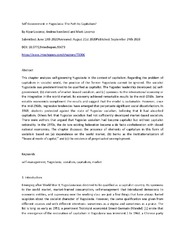Self-Government in Yugoslavia: The Path to Capitalism?
Аутори
Losoncz, Mark
Ivanišević, Andrea
Losoncz, Alpar
Остала ауторства
Bobek, VitoQuah, Chee-Heong
Поглавље у монографији (Објављена верзија)
Метаподаци
Приказ свих података о документуАпстракт
This chapter analyzes self-governing Yugoslavia in the context of capitalism. Regarding the problem of capitalism in socialist world, the practice of the former Yugoslavia cannot be ignored. The socialist Yugoslavia was predetermined to be qualified as capitalist. The Yugoslav leadership developed: (a) self-government, (b) elements of market-biased socialism, and (c) openness to the international economy or the integration in the world market. Its economy achieved remarkable results by the mid-1960s. Some notable economists compliment the results and suggest that the model is sustainable. However, since the mid-1960s, regressive tendencies have emerged that perpetuate significant social dissatisfaction. In 1968, students protested against the state of Yugoslav socialism, believing that it had absorbed capitalism. Others felt that Yugoslav socialism had not sufficiently developed market-based socialism. There were authors that argued that Yugoslav socialism had become capitalist but wit...hout capitalist rationality. In the 1970s, the de iure existing federation became a de facto confederation with closed national economies. The chapter discusses the presence of elements of capitalism in this form of socialism based on (a) dependence on the world market, (b) banks as the institutionalization of “financial mode of capital,” and (c) the existence of perpetuated unemployment.
Кључне речи:
self-management / Yugoslavia / socialism / capitalism / marketИзвор:
Emerging Markets, 2021, 193-209Издавач:
- London: Intechopen
Финансирање / пројекти:
- Министарство науке, технолошког развоја и иновација Републике Србије, институционално финансирање - 200025 (Универзитет у Београду, Институт за филозофију и друштвену теорију) (RS-MESTD-inst-2020-200025)
Колекције
Институција/група
IFDTTY - CHAP AU - Losoncz, Mark AU - Ivanišević, Andrea AU - Losoncz, Alpar PY - 2021 UR - http://rifdt.instifdt.bg.ac.rs/123456789/2334 AB - This chapter analyzes self-governing Yugoslavia in the context of capitalism. Regarding the problem of capitalism in socialist world, the practice of the former Yugoslavia cannot be ignored. The socialist Yugoslavia was predetermined to be qualified as capitalist. The Yugoslav leadership developed: (a) self-government, (b) elements of market-biased socialism, and (c) openness to the international economy or the integration in the world market. Its economy achieved remarkable results by the mid-1960s. Some notable economists compliment the results and suggest that the model is sustainable. However, since the mid-1960s, regressive tendencies have emerged that perpetuate significant social dissatisfaction. In 1968, students protested against the state of Yugoslav socialism, believing that it had absorbed capitalism. Others felt that Yugoslav socialism had not sufficiently developed market-based socialism. There were authors that argued that Yugoslav socialism had become capitalist but without capitalist rationality. In the 1970s, the de iure existing federation became a de facto confederation with closed national economies. The chapter discusses the presence of elements of capitalism in this form of socialism based on (a) dependence on the world market, (b) banks as the institutionalization of “financial mode of capital,” and (c) the existence of perpetuated unemployment. PB - London: Intechopen T2 - Emerging Markets T1 - Self-Government in Yugoslavia: The Path to Capitalism? SP - 193 EP - 209 DO - 10.5772/intechopen.93673 ER -
@inbook{
author = "Losoncz, Mark and Ivanišević, Andrea and Losoncz, Alpar",
year = "2021",
abstract = "This chapter analyzes self-governing Yugoslavia in the context of capitalism. Regarding the problem of capitalism in socialist world, the practice of the former Yugoslavia cannot be ignored. The socialist Yugoslavia was predetermined to be qualified as capitalist. The Yugoslav leadership developed: (a) self-government, (b) elements of market-biased socialism, and (c) openness to the international economy or the integration in the world market. Its economy achieved remarkable results by the mid-1960s. Some notable economists compliment the results and suggest that the model is sustainable. However, since the mid-1960s, regressive tendencies have emerged that perpetuate significant social dissatisfaction. In 1968, students protested against the state of Yugoslav socialism, believing that it had absorbed capitalism. Others felt that Yugoslav socialism had not sufficiently developed market-based socialism. There were authors that argued that Yugoslav socialism had become capitalist but without capitalist rationality. In the 1970s, the de iure existing federation became a de facto confederation with closed national economies. The chapter discusses the presence of elements of capitalism in this form of socialism based on (a) dependence on the world market, (b) banks as the institutionalization of “financial mode of capital,” and (c) the existence of perpetuated unemployment.",
publisher = "London: Intechopen",
journal = "Emerging Markets",
booktitle = "Self-Government in Yugoslavia: The Path to Capitalism?",
pages = "193-209",
doi = "10.5772/intechopen.93673"
}
Losoncz, M., Ivanišević, A.,& Losoncz, A.. (2021). Self-Government in Yugoslavia: The Path to Capitalism?. in Emerging Markets London: Intechopen., 193-209. https://doi.org/10.5772/intechopen.93673
Losoncz M, Ivanišević A, Losoncz A. Self-Government in Yugoslavia: The Path to Capitalism?. in Emerging Markets. 2021;:193-209. doi:10.5772/intechopen.93673 .
Losoncz, Mark, Ivanišević, Andrea, Losoncz, Alpar, "Self-Government in Yugoslavia: The Path to Capitalism?" in Emerging Markets (2021):193-209, https://doi.org/10.5772/intechopen.93673 . .


